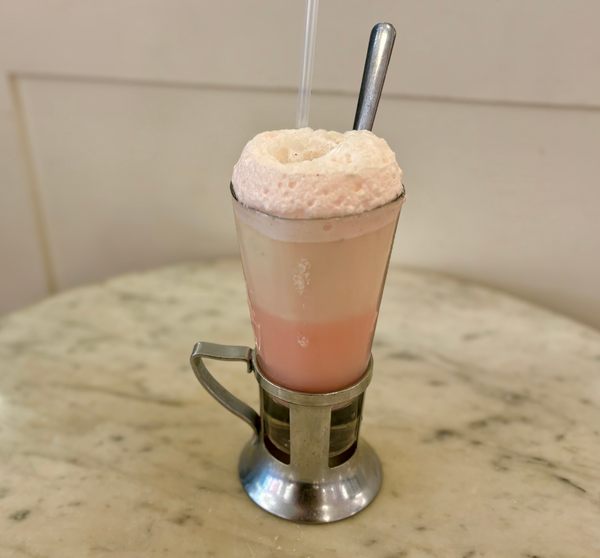Though Cincinnati is best known for breweries, another effervescent beverage has a long history in the Queen City: the nectar soda.
Home to the oldest pharmacy college in the U.S. west of the Alleghenies, the Eclectic Medical Institute (1845-1952), and Lloyd Brothers Pharmacists, Cincinnati was long on the forefront of the pharmaceutical industry. The city had a number of apothecaries with soda fountains, as well as confectioners serving countless carbonated concoctions—some claiming to cure a variety of ailments, and others simply providing customers with something sweet and refreshing to drink.
Enter the nectar soda. The flavor is a combination of vanilla and bitter almond, and the drink is pastel pink in color—a nod to the hue of almond flowers, according to Dann Woellert, a Cincinnati food historian, etymologist, and the author of Cincinnati Candy: A Sweet History. Nicknamed the “drink of the gods,” the bitter almond flavor of nectar soda balances out what would otherwise be overly sweet vanilla, creating an addictive taste that grows on you with each sip.
Nectar sodas have been served in Cincinnati since at least the late 1870s, though, like many iconic foods and beverages, its precise origins are murky. The only other U.S. city to embrace nectar sodas was New Orleans, but unlike Cincinnati, the tradition fizzled out in the Big Easy in the mid-20th century. Plus, Woellert says that the Queen City popularized them first. “They were served in Cincinnati nearly a decade before New Orleans,” he says.
While the Cincinnati nectar soda has multiple origin stories, each crediting a different pharmacist or confectioner, Woellert has concluded that John Mullane created the flavor after traveling to Quebec City to learn the art of confectionery from a prominent Canadian candymaker. He began serving nectar sodas in his confectionery shop in downtown Cincinnati in the late 1870s.
So, why did the nectar soda end up in Cincinnati and New Orleans, of all places? Wollert suspects that the bitter almond and vanilla flavor was used by the French Acadians who settled in both Quebec City and New Orleans.
Though nectar sodas aren’t as common as they were in the early 20th century, when they could be found at countless confectioneries and pharmacy soda fountains across Cincinnati, they’re still served at establishments throughout the city and the surrounding area. Nectar sodas have been on the menu at ice cream and chocolate shop Aglamesis Brothers since it opened in Cincinnati in 1908, if not shortly thereafter. That’s according to company president and CEO Randy Young, who is also a third-generation family member.
It’s unclear when nectar sodas were added to the menu at Graeter’s, a Cincinnati ice cream and chocolate shop that opened in 1870 and now has locations throughout the city and the Midwest, but Chip Graeter, chief of retail operations and a fourth-generation family member, says that they were especially popular throughout the 1940s, 1950s and 1960s.
In a January 28, 1947 article in the Cincinnati Enquirer, Tom Moore, the head of the soda department at Dow Drug Store—which operated 32 soda fountains throughout the metropolitan area at that time—said that “nectar is one of the most popular flavors in all of their stores, and has been for many years.” Five years prior, Dow ran an ad in the same newspaper which read: “Be glad you live in Cincinnati, the only place in the country where you can enjoy a Dow double-dip nectar soda.”
Originally, nectar syrup was made by combining half-and-half or milk with water, bitter almond extract, vanilla extract and red food coloring. While Aglamesis eventually switched to a dairy-free shelf-stable syrup, Graeter’s recipe has never changed—it still contains milk and needs to be refrigerated.
Both Aglamesis and Graeter’s make nectar soda by mixing nectar syrup with a dollop of whipped cream, adding a scoop or two of vanilla ice cream, then topping it off with some soda water and more whipped cream.
Though Young says that nectar sodas are most popular with older adults, they’re also a hit with members of younger generations who try them. “People who grew up with them still love them today,” Graeter says. “We still make them in all of our stores, but they’re not nearly as popular today as they once were, simply because milkshakes and smoothies have taken over.”
According to Young, there is a commercially available descendant of the nectar soda. “Commercial soda companies like Barqs and others came out with their version of cream soda—a bright pink soda—which got its flavoring from nectar soda,” he explains.

